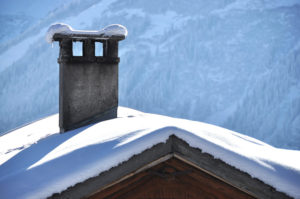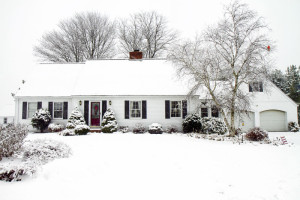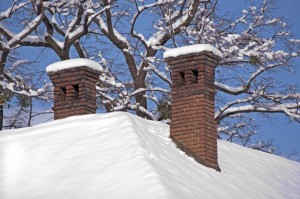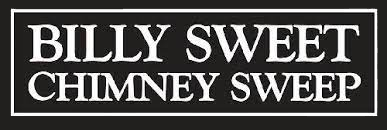by Billy Sweet | Jan 28, 2020 | Winter Chimney Damage
Whether you’ve had a harsh winter already this year, or your chimney sustained damage in the past, it’s important to diagnose and repair the damage as soon as possible. Winter-damaged masonry can lead to more serious problems and costs in the future, so the sooner you call a professional, the better.
 Common Winter Damage
Common Winter Damage
- Chimney Leaks – When water enters the chimney system it can be catastrophic, leading to water damage in the chimney system itself, the fireplace or appliance, and also the rest of the home. The water may enter by a faulty chimney cap, damaged crown, spalling masonry, or dislodged flashing, but the water may travel through the home and form a leak elsewhere, many rooms away from the chimney. Expert tip: have your chimney system inspected annually and waterproofed after repairs so that the masonry is protected from water penetration.
- Spalling Masonry – When the masonry becomes cracked, crumbles, and bricks and mortar pieces begin to fall, this is called spalling. Spalling masonry is extremely dangerous for the chimney and can cause bricks to fall onto and damage the roof and landscaping below as it becomes more serious. Expert tip: have your masonry waterproofed with a deep-penetrating water repellent by Billy Sweet Chimney Sweep to prevent water masonry damage. Schedule a professional to repair your masonry through a process called tuckpointing.
- Crown Damage – Winter weather can wreak havoc on a chimney crown that is old, poorly maintained, and improperly constructed. If a crown is too thin, flat, or made of the wrong materials, water can penetrate it during winter months and then freeze, causing more damage through what’s called the freeze-thaw cycle. Expert tip: ask your chimney professional specific questions about crown construction. It should be constructed with the right materials and design for a lasting crown.
- Dislodged Flashing – Harsh winter temperatures and storms can lead to dislodged flashing. Since the intersection of the chimney and roof is the most vulnerable part of your entire chimney system, dislodged flashing can have serious hazardous results. Expert tip: look at your flashing after strong winds or prolonged ice or snow exposure. Exposed nails, shifted metal, and missing flashing is reason to call a professional right away.
The Freeze-Thaw Cycle
Winter is the most common time for chimney damage that has nothing to do with the fire. Yes, you’re using your fireplace more, but winter damage is caused by outside forces—temperatures, pressures, precipitation, animals, and more. The worst thing that can happen to your chimney during winter months is water penetration. Because masonry is porous by nature, allowing water to penetrate beyond the surface, freezing temperatures can be devastating as the moisture trapped in the masonry freezes and thaws. Water fills the gaps and voids in the masonry, then freezes as temperatures fall. The water expands as it freezes, breaking apart the masonry. Then when a fire is lit or the sun warms the chimney again the water thaws and moves further into the damaged masonry. This process repeats all winter long, causing serious damage in a short time. If this damage isn’t repaired and the chimney waterproofed, the chimney may require a serious repair or rebuild. If the damage remains throughout the spring months, water will have a direct route into the chimney system to make more damage.
Chimney Repairs and Waterproofing in Boston, North Shore, and Portland
Home and business owners in and around Boston, North Shore, and Portland areas continue to depend on Billy Sweet Chimney Sweep for all their ongoing chimney needs, including repairs and waterproofing services. Our goal to keep our friends and neighbors in our service area safe and warm each winter is the reason why we offer expert services like crown repair, tuckpointing, chimney relining, rebuilds, renovations, and more. We also specialize in preventive services such as waterproofing, chimney sweeps, and CSIA inspections.
Our chimney experts are CSIA certified chimney sweeps, experienced master masons, and trained installers. When you hire a Billy Sweet Chimney Sweep you are depending on the best our service area has to offer. We show up with clear ID tags, clean uniforms, and branded company vehicles. You will never second guess your choice in companies or technicians. We keep your home clean of toxins and dirtiness while we work and hand you a written report when the service is complete. If your chimney requires repairs, we provide before and after footage for your own records and to present to your home-owners insurance or realtor. We use a camera system to get up-close-footage during each chimney sweep and inspection and offer a complimentary carbon monoxide test to insure hidden dangers aren’t present.
Schedule Now
We are only just into winter, but damage can occur in a short time. Damage from previous years can go unnoticed, and all you notice as a homeowner is the repercussion. If your fireplace, stove, or chimney is suddenly working improperly, if you notice signs of water damage, or the system works differently in any way, it’s time to have it checked out.
Contact Billy Sweet Chimney Sweep now to schedule important diagnostic services. Call 617-469-4528 today.
by Billy Sweet | Apr 29, 2019 | Winter Chimney Damage
Winter may be over and your fireplace closed down for the off-season, but that doesn’t mean it can’t cause problems for your home. It’s common for even a well- maintained chimney to experience winter damage. Like any system or appliance in the home, it should be serviced regularly in order to prevent serious damage and malfunction from time and use. Scheduling a chimney sweep and inspection in the spring can prevent further damage, allow for easier payment, and lead to a safer and more efficient chimney system.
Common Winter Damage
Your common winter damage can all be detected during a standard chimney sweep or diagnostic inspection. When we complete spring services to our customers at Billy Sweet Chimney Sweep, we often find masonry damage, damaged or missing parts, chimney leaks and water damage, and liner damage. Masonry damage and parts damage is most common after a long, bitter winter due to what we call the freeze/thaw cycle.
The Freeze/Thaw Cycle
When water penetrates the masonry, even small amounts of water, you can count on some winter damage when temperatures regularly cycle into freezing numbers. Water enters the system whether through rainfall, snow, or sleet and fills cracks and crevices. This water remains in these spaces as temperatures drop, causing it to freeze and expand. As the water expands, it breaks apart the masonry. When the temperature rises again due to sunlight on the chimney or a fire in the firebox, the ice melts and moves further into the damaged portions of masonry before the cycle repeats and it freezes again. This freeze/thaw cycle occurs all winter long, reaching into your masonry and devastating it if it isn’t corrected.
Spring Repairs and Leak Prevention
You can prevent chimney leaks even when your chimney has winter damage like masonry cracks and gaps. Scheduling services with Billy Sweet Chimney Sweep is your first step in chimney repair and leak prevention.
Routine Chimney Sweeps – The safest and most efficient chimney systems are those that are cleaned regularly and inspected annually, according to the National Fire Protection Association (NFPA). Sweeps not only keep your flue working properly and safely but during these important appointments, your chimney professional will notice and report any damage that should be repaired.
Annual Chimney Inspections – Like sweeps, inspections keep the system working properly, but an inspection is a thorough assessment of the entire system, including the interior flue. Most chimney damage isn’t noticed by the homeowner because it occurs behind the scenes. When you schedule an inspection with a certified expert, you can rest assured that no hazard has gone undetected.
Masonry Repairs – When your masonry has been damaged by winter weather, you can count on Billy Sweet Chimney Sweep for your masonry repairs. Whether it’s tuckpointing, crown replacement, or firebox repairs, we have got you covered.
Not only do we repair your winter damage, but we can apply a water repellent to help prevent recurrence next winter! Call Billy Sweet Chimney Sweep today at 617-469-4528 or request an appointment online.
by Billy Sweet | Nov 7, 2017 | Winter Chimney Damage
Like most regions of the country, New England is experiencing a slow start to winter. Your chimney, even when not in use, is still affected by the weather. Our customers in Boston, North Shore, and Portland can expect temperatures to drop toward winter lows by the end of November. In order to avoid winter damage, homeowners should understand how the chimney works, and how water affects masonry.
Winter Damage
Most winter damage is actually water damage. Water simply acts differently in the winter, causing more damage, and wreaking havoc on masonry.
The Freeze/Thaw Cycle
When water penetrates the masonry, it seeps into cracks and voids. As the chimney cools or temperature drops, the water freezes, expanding and breaking apart the masonry. When the chimney warms up again, the water melts and moves further into the damaged masonry. This process continues throughout winter, damaging the chimney itself, and the rest of the system.
Water Damage
Water will ruin a masonry chimney from the inside out. It causes rusted parts and components, stained walls, deteriorated flue lining system, and more. A chimney leak can even cause a leak in any other part of the house when water runs through floors and walls, costing in repairs and even causing respiratory issues when bacteria grows in walls and flooring.
Spalling
Common winter masonry damage includes spalling bricks and mortar. Spalling masonry is when the mortar between bricks cracks and falls away. Homeowners might not notice spalling masonry until pieces of mortar or whole bricks fall into the yard! This is not only a hazard, but allows water into the system to cause damage. A certified chimney sweep can repair spalling masonry through a process called tuckpointing, or re pointing. First, the technician removes the affected mortar, then replaces it with new mortar. This job must be done meticulously, because if the new mortar is not the same consistency and strength as the old, it can result in weakened masonry. If the color is off, it can also affect the visual aesthetics of your chimney.
When you have a chimney, it’s important to protect it from winter damage, including spalling and water damage. You can prevent this occurrence by scheduling your annual chimney inspection with Billy Sweet Chimney Sweep. When your chimney is inspected, your technician can report weaknesses and repair them before cold weather hits. You can also schedule chimney waterproofing to protect your masonry against water damage. This industrial water repellent forms a barrier that keeps water out, while letting vapors escape. When it comes to prevention, waterproofing is a great investment, and is long-lasting.
To schedule you inspection, preventative services, or repairs, call Billy Sweet today. Call 617-469-4528 and talk to a chimney expert about protecting your chimney from the cold.
by Billy Sweet | Feb 24, 2015 | Winter Chimney Damage
A lot of folks are thanking their lucky stars that March is finally rolling in. All over the United States there has been record-breaking winter weather; snow, sleet, hail and ice have all taken their toll on homes across America. If you use your fireplace or wood-burning stove to heat your home, then you’ve likely gotten your money’s worth this winter. Because of the drastic weather we’ve had this year, it’s more important than ever to stay on top of any chimney damage.

Ice Damming Can Damage Chimneys
Snow and ice build up is a serious concern for many homeowners when the weather gets cold. Ice damming is a real problem during the winter months, and this year has affected the Southeast United States more than usual. When rain and freezing rain hits a roof and freezes solid before it can drain through the gutters it can get trapped and cause what is known as an ice dam. This can cause terrible damage to your roof, but it can also damage the masonry of your chimneys. If you’ve had a lot of freezing rain, inspect your gutters and be sure to call a professional gutter cleaner if you suspect an ice dam.
Snow, Hail and Rain Inside Chimneys Can Cause Damage
If you’ve stayed diligent in your chimney repair and maintenance, you’ve likely installed a top sealing damper or a chimney cap. These easy-to-install add-ons to your chimney can prevent moisture from entering. Without them, the winter elements can leak into your chimney and cause serious problems. Not only can the moisture damage the brick and mortar of your chimneys, but also a build up of moisture can cause the fires in your fireplace or stove to not burn hot enough. Fires that aren’t burning hot enough are not only inefficient at heating your home, but can also leave behind creosote, a potentially harmful chemical trapped inside your chimney.
Prevention Is Key When Avoiding Winter Chimney Damage
With due diligence, you can keep your chimney and fireplace in top working order. As with many homeowner responsibilities, prevention is the best way to avoid costly and potentially dangerous damage to your home. Some additional steps you can take to avoid winter weather chimney damage are:
Have the inside of your chimney professionally lined to protect the inside.
Carefully inspect your roof and chimney after a big storm.
Have a professional remove ice build up from your gutters after a lot of rain or freezing rain.
Professionally clean your fireplace before and after the winter season.
A professional chimney sweeping company like Billy Sweet Chimney Sweep in the Boston, Massachusetts area can help maintain your chimney year after year. Before you light your first fire, have a certified inspector thoroughly inspect the interior and exterior of your chimney and fireplace. If your chimney sweeping company recommends masonry repairs have them completed well before you plan to use your chimney to heat your home. Not only will an inspection prevent costly damage, it will also help you burn efficient fires that will provide warmth and comfort during the worst winter weather.
 Common Winter Damage
Common Winter Damage

